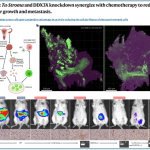
15. Proteomics of cell-free breast cancer scaffolds identify clinically relevant imprinted proteins and cancer-progressing properties
In this top publication in a prestigious high impact journal, the composition and presence of imprinted proteins in the breast cancer microenvironment and its potential associations with clinical properties of the disease, were defined using global proteomic analysis of 63 decellularized patient-derived scaffolds (PDSs). Remarkable differences in the composition of the important cancer niche surrounding cancer cells were observed, and specific proteins associated with disease recurrences, age and cancer type could be identified. The ground-breaking results suggest that breast cancers can be subclassified based on the scaffold composition not only limited to ECM-associated proteins but also incorporated proteins linked to processes such as secretion, transport, localization, immune response, and metabolism. Importantly, properties of the PDSs were indeed linked to clinical characteristics of the cancer disease, suggesting that qualities of the cancer microenvironment can add clinically relevant information for breast cancer.






